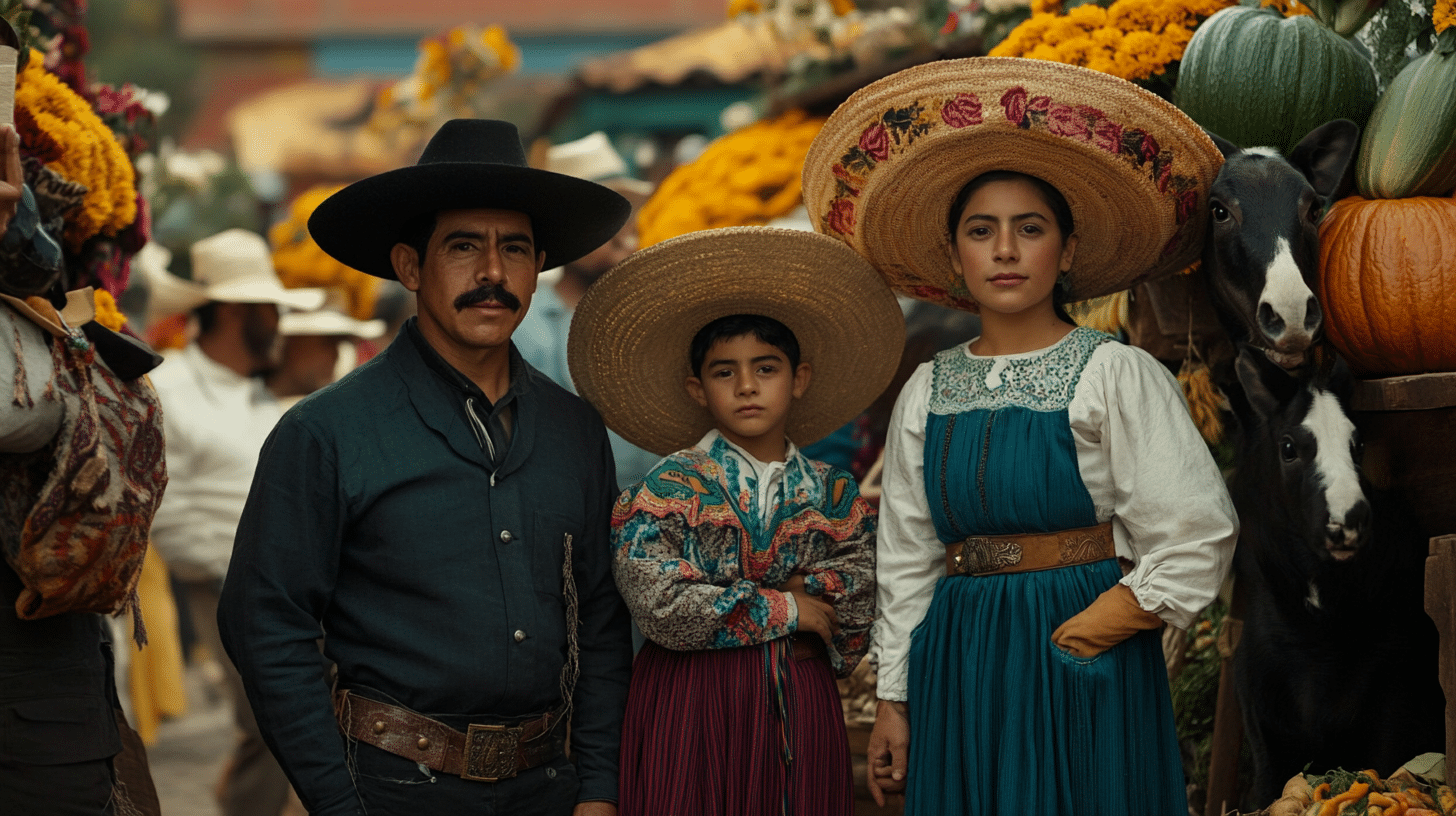
Did you know your Mexican last name tells a unique story?
Many people struggle to understand their Mexican family history through surnames. Finding the roots and meanings of these names often feels like searching through a maze.
But you might not know that Mexican last names blend Native American names with Spanish colonial influences, creating a rich mix of history.
These names tell stories of ancient tribes, skilled craftsmen, and noble families.
We’ve gathered 105 common Mexican surnames, complete with their origins and meanings. Each name opens a window into Mexico’s past – from the Aztec empire to modern times.
Read on to learn what your family name means and the story it tells about your ancestors.
105 Common Surnames In Mexico And Their Origins
1. Acevedo
- Meaning: Refers to someone who lived near holly trees.
- Origin: Spanish, from the word “acebo,” meaning holly.
2. Aceves
- Meaning: A variation of Acevedo, indicating someone who resided near holly trees.
- Origin: Spanish, derived from geographical locations with holly trees.
3. Álvarez
- Meaning: Means “son of Álvaro,” with Álvaro signifying “guardian.”
- Origin: Spanish, from Old Germanic roots.
4. Aguilar
- Meaning: Refers to a place where eagles are found.
- Origin: Spanish, often from locations named Aguilar in Spain.
5. Alcántara
- Meaning: Refers to a bridge, symbolizing connection.
- Origin: Arabic, derived from “al-Qantara.”
6. Aranda
- Meaning: Means “valley of the eagles” or simply “valley.”
- Origin: Spanish, associated with geographic features.
7. Arriaga
- Meaning: Refers to someone from a rocky area.
- Origin: Basque, derived from geographical terms.
8. Ayala
- Meaning: Means “hillside pasture” or a fertile slope.
- Origin: Basque, referring to agricultural areas.
9. Báez
- Meaning: Indicates descent from Pelayo, a historical figure.
- Origin: Spanish, rooted in the Latin “Palaio,” meaning ancient.
10. Balderas
- Meaning: Refers to a valley or lowland.
- Origin: Spanish, derived from a place in Spain.
11. Barrientos
- Meaning: Denotes someone from a town named Barrientos.
- Origin: Spanish, from geographic place names.
12. Becerra
- Meaning: Refers to a young cow or calf, symbolizing strength.
- Origin: Spanish, associated with cattle farming.
13. Beltrán
- Meaning: Means “bright raven,” symbolizing intelligence and wisdom.
- Origin: Spanish, from Old Germanic roots.
14. Bermúdez
- Meaning: Refers to “son of Bermudo,” meaning bold or brave.
- Origin: Spanish, rooted in Old Spanish.
15. Caballero
- Meaning: Refers to a knight or a noble horseman.
- Origin: Spanish, symbolizing chivalry.
16. Calderón
- Meaning: Means “large cooking pot,” possibly referencing a trade.
- Origin: Spanish, associated with metalworking.
17. Camacho
- Meaning: Means “bent” or “twisted,” often used as a nickname.
- Origin: Spanish, of unknown origin.
18. Campos
- Meaning: Refers to “fields” or “countryside.”
- Origin: Spanish, from rural or farming areas.
19. Canales
- Meaning: Means “canals” or waterways, indicating residence near them.
- Origin: Spanish, derived from geographic locations.
20. Cárdenas
- Meaning: Refers to the color purple or blue, often associated with thistles.
- Origin: Spanish, from place names in Spain.
21. Carrillo
- Meaning: Means “cheek” or “jaw,” possibly a nickname for facial features.
- Origin: Spanish, used as a descriptive surname.
22. Castillo
- Meaning: Means “castle,” often denoting someone living near one.
- Origin: Spanish, from fortified places.
23. Castañeda
- Meaning: Refers to a chestnut grove.
- Origin: Spanish, from areas with chestnut trees.
24. Cervantes
- Meaning: Derived from “ciervo,” meaning deer, symbolizing agility.
- Origin: Spanish, from regions associated with hunting.
25. Chávez
- Meaning: Means “keys,” symbolizing access or guardianship.
- Origin: Spanish, derived from the name Chaves in Portugal.
26. Colón
- Meaning: Derived from the Latin “Columba,” meaning dove, symbolizing peace.
- Origin: Spanish, often referring to explorers like Christopher Columbus.
27. Contreras
- Meaning: Means “opposite” or “contrary,” possibly a location reference.
- Origin: Spanish, linked to geographic names.
28. Correa
- Meaning: Refers to a belt or strap, possibly a trade-related name.
- Origin: Spanish, from leatherworking traditions.
29. Coronado
- Meaning: Means “crowned,” symbolizing honor or achievement.
- Origin: Spanish, linked to nobility.
30. Cruz
- Meaning: Refers to the “cross,” symbolizing Christianity.
- Origin: Spanish, from religious or geographic markers.
31. Cuéllar
- Meaning: Refers to a basin or hollow.
- Origin: Spanish, associated with geographic features.
32. De la Cruz
- Meaning: Refers to someone associated with the cross.
- Origin: Spanish, a religious surname.
33. De León
- Meaning: Means “of León,” referring to a region.
- Origin: Spanish, linked to geographic areas.
34. Del Toro
- Meaning: Means “of the bull,” symbolizing strength.
- Origin: Spanish, referring to locations associated with bulls.
35. Delgado
- Meaning: Refers to someone who is thin or slender.
- Origin: Spanish, often used as a descriptive surname.
36. Domínguez
- Meaning: Means “son of Domingo,” meaning “of the Lord.”
- Origin: Spanish, derived from Latin roots.
37. Duarte
- Meaning: Means “guardian of wealth.”
- Origin: Spanish and Portuguese, a variant of Eduardo.
38. Escobar
- Meaning: Refers to someone living near broom plants or thickets.
- Origin: Spanish, derived from vegetation-related place names.
39. Esquivel
- Meaning: Refers to someone from a valley or plain.
- Origin: Basque, from geographic terms.
40. Estrada
- Meaning: Refers to a road or path.
- Origin: Spanish, indicating someone who lived near a path.
41. Fernández
- Meaning: Means “son of Fernando,” with Fernando meaning “brave traveler.”
- Origin: Spanish, from Old Germanic roots.
42. Fajardo
- Meaning: Refers to someone with a striped or belted appearance.
- Origin: Spanish, possibly linked to garments or military terms.
43. Flores
- Meaning: Means “flowers,” symbolizing beauty and nature.
- Origin: Spanish, often used poetically.
44. Franco
- Meaning: Means “free” or “Frank,” referencing the Frankish people.
- Origin: Spanish, with roots in Latin.
45. Fuentes
- Meaning: Refers to fountains or springs, symbolizing abundance.
- Origin: Spanish, often used geographically.
46. Galindo
- Meaning: Possibly means “stronghold” or “fortified place.”
- Origin: Spanish, of Celtic or Old Germanic origin.
47. Gallegos
- Meaning: Refers to someone from Galicia, a region in Spain.
- Origin: Spanish, tied to geographic identity.
48. García
- Meaning: Means “bear,” symbolizing strength and bravery.
- Origin: Spanish, with Basque origins.
49. Gracia
- Meaning: Means “grace” or “favor.”
- Origin: Spanish, from the Latin “gratia.”
50. Guerrero
- Meaning: Means “warrior,” indicating a brave or soldierly person.
- Origin: Spanish, associated with military roles.
51. Gutiérrez
- Meaning: Means “son of Gutierre,” meaning “ruler of the army.”
- Origin: Spanish, from Old Germanic roots.
52. Hidalgo
- Meaning: Refers to a nobleman or someone of high rank.
- Origin: Spanish, from the term “hijo de algo” (son of something).
53. Huerta
- Meaning: Means “orchard” or “garden,” often indicating a farmer.
- Origin: Spanish, tied to agriculture.
54. Ibáñez
- Meaning: Means “son of Juan,” with Juan meaning “gracious.”
- Origin: Spanish, from the Latin “Iohannes.”
55. Ibarra
- Meaning: Refers to a valley or plain.
- Origin: Basque, linked to geographical features.
56. Jiménez
- Meaning: Means “son of Jimeno,” meaning “heard or respected.”
- Origin: Spanish, from Old Basque roots.
57. Juárez
- Meaning: Means “son of Suero,” derived from a personal name.
- Origin: Spanish, with historical significance.
58. León
- Meaning: Means “lion,” symbolizing courage and strength.
- Origin: Spanish, often linked to the León region.
59. López
- Meaning: Means “son of Lope,” with Lope meaning “wolf.”
- Origin: Spanish, with Old Germanic roots.
60. Luna
- Meaning: Means “moon,” symbolizing beauty or mystery.
- Origin: Spanish, often used poetically.
61. Mancilla
- Meaning: Refers to a stain or blemish, metaphorically for reputation.
- Origin: Spanish, used symbolically.
62. Martínez
- Meaning: Means “son of Martín,” with Martín meaning “of Mars.”
- Origin: Spanish, derived from Latin roots.
63. Mendoza
- Meaning: Means “cold mountain,” referencing a location.
- Origin: Spanish, often linked to geographic features.
64. Morales
- Meaning: Refers to mulberry trees or shrubs.
- Origin: Spanish, often tied to agricultural locations.
65. Montoya
- Meaning: Refers to someone from a mountainous region.
- Origin: Spanish, derived from geographic terms.
66. Muñoz
- Meaning: Means “son of Munio,” meaning “protector.”
- Origin: Spanish, with Old Basque origins.
67. Nava
- Meaning: Refers to a plain or valley.
- Origin: Spanish, often used geographically.
68. Navarro
- Meaning: Means “from Navarre,” a region in Spain.
- Origin: Spanish, linked to geography.
69. Nieto
- Meaning: Means “grandchild,” symbolizing lineage.
- Origin: Spanish, often used affectionately.
70. Ocampo
- Meaning: Refers to an open field or plain.
- Origin: Spanish, tied to rural settings.
71. Olvera
- Meaning: Refers to someone from olive-growing regions.
- Origin: Spanish, linked to agriculture.
72. Orozco
- Meaning: Refers to a berry bush or thicket.
- Origin: Basque, from vegetation-related place names.
73. Ortega
- Meaning: Means “nettle plant,” referencing a location.
- Origin: Spanish, derived from flora-based terms.
74. Palacios
- Meaning: Refers to palaces or mansions, symbolizing wealth.
- Origin: Spanish, tied to nobility.
75. Peña
- Meaning: Refers to a rock or cliff, indicating residence near one.
- Origin: Spanish, from geographic features.
76. Pérez
- Meaning: Means “son of Pedro,” with Pedro meaning “rock.”
- Origin: Spanish, from biblical roots.
77. Pineda
- Meaning: Refers to a pine grove or forest.
- Origin: Spanish, tied to forested areas.
78. Quiñones
- Meaning: Refers to a group of five, possibly linked to land divisions.
- Origin: Spanish, used in administrative contexts.
79. Ramírez
- Meaning: Means “son of Ramiro,” meaning “wise protector.”
- Origin: Spanish, from Old Germanic roots.
80. Reyes
- Meaning: Means “kings,” symbolizing honor or divinity.
- Origin: Spanish, often tied to the Magi or royalty.
81. Ríos
- Meaning: Refers to rivers, indicating residence near one.
- Origin: Spanish, from geographic features.
82. Rojas
- Meaning: It means “red,” possibly a nickname for red hair.
- Origin: Spanish, from descriptive surnames.
83. Salazar
- Meaning: Refers to an old hall, symbolizing heritage.
- Origin: Spanish, with Basque roots.
84. Sánchez
- Meaning: Means “son of Sancho,” with Sancho meaning “saintly.”
- Origin: Spanish, derived from Latin.
85. Serna
- Meaning: Refers to cultivated land or a field.
- Origin: Spanish, tied to agriculture.
86. Sierra
- Meaning: Refers to a mountain range.
- Origin: Spanish, from geographic terms.
87. Solís
- Meaning: Refers to ground exposed to sunlight.
- Origin: Spanish, tied to locations.
88. Torres
- Meaning: This means “towers,” indicating a residence near one.
- Origin: Spanish, linked to fortified structures.
89. Treviño
- Meaning: Refers to a town or settlement.
- Origin: Spanish, often from place names.
90. Valdez
- Meaning: Refers to a valley or lowland.
- Origin: Spanish, from geographical features.
91. Valencia
- Meaning: Refers to strength, often linked to the city of Valencia.
- Origin: Spanish, derived from Latin.
92. Varela
- Meaning: Refers to a fenced or enclosed area.
- Origin: Spanish, tied to agricultural settings.
93. Vargas
- Meaning: It means “thatched hut,” which is often tied to rural living.
- Origin: Spanish, from geographic terms.
94. Vázquez
- Meaning: Means “son of Vasco,” with Vasco meaning “crow.”
- Origin: Spanish, derived from Old Basque.
95. Velázquez
- Meaning: Means “son of Velasco,” meaning “raven.”
- Origin: Spanish, from descriptive surnames.
96. Vera
- Meaning: Means “truth,” symbolizing honesty.
- Origin: Spanish, often tied to virtues.
97. Verdugo
- Meaning: It means “executioner,” which symbolizes justice or duty.
- Origin: Spanish, tied to official roles.
98. Villalobos
- Meaning: Refers to a “village of wolves,” symbolizing wildness.
- Origin: Spanish, from place names.
99. Villanueva
- Meaning: Means “new town,” referencing settlement origins.
- Origin: Spanish, tied to geographic features.
100. Villarreal
- Meaning: Means “royal town,” denoting nobility.
- Origin: Spanish, from historical settlements.
101. Zaldívar
- Meaning: Refers to a valley or plain.
- Origin: Basque, from geographic roots.
102. Zamora
- Meaning: Refers to someone from Zamora, a city in Spain.
- Origin: Spanish, from a place name.
103. Zapata
- Meaning: Means “shoe,” symbolizing craftsmanship.
- Origin: Spanish, tied to cobblers or trades.
104. Zepeda
- Meaning: Refers to abundance or fertility.
- Origin: Spanish, often linked to agricultural lands.
105. Zúñiga
- Meaning: Refers to a place name in Navarre, Spain.
- Origin: Basque, tied to geographical identities.
How To Research Your Mexican Ancestry Through Last Names

Your family name holds clues about your Mexican heritage.
Start by checking birth certificates, marriage licenses, and old passports. These papers often show name changes and family ties. Your older relatives can share stories that official records won’t tell.
The internet makes research simpler. Check the Mexican National Archives and FamilySearch.org for church records and old census data. These sites let you search Mexican collections from home.
Mexican naming patterns help track families. Most people use two last names – from their father and mother.
Women keep their maiden names after marriage. Names might have changed spelling when families crossed borders.
Keep in mind that some records got lost over time. Fires destroyed papers, and migration led to name changes.
Stay organized by making a timeline and taking pictures of documents you find.
Conclusion
Every Mexican surname carries a story of family, culture, and history. From names rooted in ancient tribes to those born from Spanish traditions, these family names paint a picture of Mexico’s rich past.
Now that you know the meanings behind these names, you can start your own search.
Pull out those old family albums, talk to your relatives, and visit local record offices. Each step brings you closer to understanding your heritage.
Want to learn more? Use your newfound knowledge to create a family tree.
Share your findings with relatives—you might spark memories and stories you’ve never heard before.

